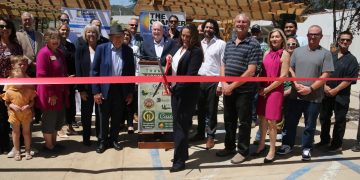La Jollans heard from State Sen. Marty Block on progress in healthcare education and also became clued in on the latest developments with cell towers and problematic youth behavior in the Beach-Barber Tract, at La Jolla Town Council’s August meeting.
Block, a former San Diego State University professor whose 39th Senate District represents about 1 million people, including San Diego’s La Jolla neighborhood, talked about his legislative agenda.
“My background is mostly in higher education,” said Block, chair of the state senate Education Budget subcommittee and a member of the Banking and Financial Institutions Committee.
Block is most proud of legislation he passed last year, which authorized California community colleges, in consultation with the California State University and University of California systems, to offer bachelor’s degrees at the 15 community colleges, degrees that are not available at the state’s public four-year schools. The college districts must document the unmet workforce needs that the degree would help fill.
“Last year for the first time, community colleges offered a limited number of four-year degrees in the healthcare field training radiological technicians or health information management,” said Block.
The state senator also was involved in sponsoring legislation to end human trafficking.
Block noted the state budget picture has substantially improved.
“This year, we balanced the budget and finished with a $3 billion surplus instead of a $42 billion deficit, like we had (once) in the past,” he said.
Noting he’s now a La Jolla resident, Block said he’s in Sacramento most weekdays while state lawmakers are in session then returns to the district for office hours on Fridays and for the weekend.
Block noted it’s his office’s responsibility to help constituents with any state-related matters. He said he also hosts a number of public workshops on timely topics like senior scams, student loans and foreclosures.
Regarding the federal Spectrum Act plan, which some believe could take local control away from regulating cell phone towers, Block said, “I’m opposed to that. I cannot support it in its current form.”
A contingent of residents voiced opposition to the Spectrum Act, which some believe would override all local zoning regulations including the coastal 30-foot height limit.
Barbara Bry, a candidate for City Council District 1 in 2016, said of the Spectrum Act: “We need to keep local control over how our community is impacted by these wireless communications facilities, especially regarding the voter-approved 30-foot height limit. The public has a right to be a part of this process.”
“The city is using a Process 1 permit, which is a secret plan to do this (install towers) without talking to you or me or telling us about it,” resident Lou Cumming argued. “The wireless companies are running rampant — and the city is getting cash from each tower.”
In other matters:
• Distirct 1 City Council candidate Joe LaCava said draft language for new prospective short-term vacation rental/home-sharing regulations, ultimately to be voted on by City Council, has been released. He said it’s important to distinguish between proposed regulations that allow a room in a home to be rented out, as opposed to entire houses being rented out, especially by outside companies that come in and buy properties specifically for that purpose.
• Council trustee Ann Kerr Bache noted that the curbing of problematic under-age drinking and drug use in the Beach-Barber Tract has improved dramatically with the recent cooperation of the community, police and lifeguards. She said reps from those groups will be addressing the council in an upcoming meeting, likely in September.












Discussion about this post